人教版八年级下册unit1单词讲解
人教版初二(下)英语unit1 what's the matter知识点讲解与练习

八年级下册英语Unit 1 what’s the matter?词汇篇学生通过本讲学习,能够掌握本单元的重点词汇句型,并在综合能力上有一定的拓展。
1.matter的用法(1)名词:事情,问题What’s the matter? =what’s wrong (with you)? =what’s the trouble怎么啦?出什么事啦?(2)动词:有重大影响,有重要性如:What does it matter?2.疾病的表达法have a cold/a fever/ a toothache/ a stomachache3.take 的固定搭配take one’s temperature/ take breaks/ take risks/take some medicine/take off/ take care of/take away 4.surprise的用法1.做名词:to one’s surprise 使。
惊讶的,出乎。
意料2.做动词:surprise sb使某人吃惊3.做形容词:surprising, surprised的用法5.get的用法get off下车/get on上车/get into陷入,参与6.be used to sth/doing sth 习惯于做某事be used to do sth 被用作去做某事used to do sth 习惯于做某事7.out of的固定搭配look out of 向。
外看/ get out of从。
出来/ run out of用光基础演练1.---What’s wrong ______you?---I fell off the bike and hurt my leg.A. ofB. withC. forD. by2.Tom and Jenny enjoyed _________playing computer games.A. himselfB. herselfC. ourselvesD. themselves3. Sally became interested ___________science and wanted to be a scientist.A. forB. inC. throughD. at4. ---I had a __________.---You’d better go to see a dentist.A. headacheB. feverC. coldD. toothache5. I didn’t _________my temperature, but I knew I had a fever.A. giveB. setC. takeD. show二、根据汉语意思翻译句子。
最全面人教版八年级下册英语第一单元知识点归纳总结

Unit 1 What's the matter?一、词汇与短语◆重点单词A部分1.matter n. 问题;事情2.sore adj. 疼痛的;酸痛的3.stomachache n. 胃痛;腹痛4.foot n. 脚;足5.neck n. 颈;脖子6.stomach n. 胃;腹部7.throat n. 咽喉;喉咙8.hurt v. (使)疼痛;受伤9.fever n. 发烧10.passenger n. 乘客;旅客11.lie v. 躺;平躺12.break n. 间歇;休息13.rest v. &n. 放松;休息14.onto prep. 向;朝15.X-ray n. X射线;X光16.trouble n. 问题;苦恼17.toothache n. 牙痛18.hit n. (用手或器具)击;打19.headache n. 头痛20.herself pron. (she的反身代词)她自己21.off adv. & prep. 离开(某处);不工作;从……去掉B部分1.bandage n. 绷带v. 用绷带包扎2.press v. 压;挤;按3.sick adj. 生病的;有病的4.knee n. 膝;膝盖5.breathe v. 呼吸6.knife n. 刀7.sunburned adj. 晒伤的8.blood n. 血9.ourselves pron. (we反身代词)我们自己10.mean v. 意思是;打算11.climber n. 登山者;攀登者12.importance n. 重要性;重要13.risk n.&v. 危险;风险;冒险14.decision n. 决定;抉择15.accident n.(交通)事故;意外遭遇16.control v.&n. 限制;约束;管理17.situation n. 情况;状况18.spirit n. 勇气;意志19.kilo( = kilogram) n. 千克;公斤20.death n. 死;死亡21.rock n. 岩石22.nurse n. 护士◆重点短语A部分1.have a cold 感冒2.lie down 躺下3.have a stomachache 胃痛4.take one's temperature 量体温5.have a fever 发烧6.to one's surprise 使……惊讶的是7.get off 下车8.right away 立即;马上9.take breaks (take a break) 休息10.talk too much 说得太多11.drink enough water 喝足够的水12.have a very sore throat 嗓子非常疼13.get an X-ray 拍X光片14.see a dentist 看牙医15.drink some hot tea with honey 喝一些加蜂蜜的热茶16.put some medicine on sth.在……上面敷一些药17.feel very hot 感到很热18.sound like 听起来像19.all weekend 整个周末20.in the same way 以同样的方式21.go to a doctor 看医生22.go along 沿着……走23.on the side of the road 在马路边24.shout for help 大声呼救25.without thinking twice 没有多想26.have a heart problem 有心脏病27.thanks to 多亏了;由于28.in time 及时29.save a life 挽救生命30.get into trouble 陷入麻烦31.hurt oneself 受伤32.fall down落下;摔倒B部分1.be used to 习惯于……;适应于……2.in a difficult situation 在困境中3.take risks (take a risk) 冒险4.keep on doing sth. 继续(或坚持)做某事5.run out (of) 用尽;耗尽6.make a decision 作出决定7.cut off 切除8.get hit on the head 撞到头部9.get out of 离开;从……岀来10.be interested in 对……感兴趣11.give up 放弃12.mean doing sth. 意味着做某事13.put a bandage on sth. 用绷带包扎…14.lose one's life 失去生命15.feel sick 感到恶心16.mountain climbing 登山运动17.have problems breathing 呼吸困难18.be in control of 掌管;管理◆重点句子A部分1.What's the matter with you?=What's the trouble with you?=What's wrong with you?你怎么了?2.What should she do? 她该怎么办呢?3.Did you fall down? 你跌倒了吗?4.Should I take my temperature? 我应该量一下体温吗?5.I think I sat in the same way for too long without moving.我想我以同样的姿势一动不动地坐得太久了。
人教版八年级英语下册Unit1_SectionA_语境法讲解单词

matter ['mætə(r)] n.问题;事情
用法 固定搭配:no matter 无论
as a matter of fact 事实上
例句 It doesn’t matter. 比较 主人(master)有什么要紧事(matter)吗?
matter ['mætə(r)] n.问题;事情
物质
①They are likely to come with larger volumes of white and grey matter in
certain areas of the brain.
事态
②Unfortunately, there is nothing we can do to improve matters.
hit [hɪt] v. (hit /hɪt/) (用手或器具)击; 打
击
①We have no idea on how to hit the ball.
②In China, the bad thing has hit thousands of computers, according to
攻击
Qihoo 360.
例句 There are many passengers in this train. 比较 乘客(passenger)身份检验未通过(pass)。
off [ɒf , ɔ:f] adv.& prep. 离开(某处); 不工作; 从... 去掉
用法 固定搭配:take off 脱掉,起飞 fall off 跌落,下降 go off 走掉
例句 He clears his throat. 他清了清嗓子。
人教版八年级下册英语单词unit1,自然拼读和音标记忆5,欢迎收藏
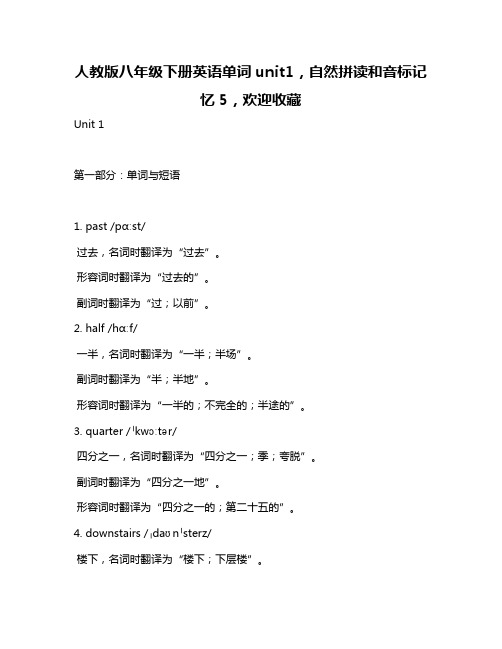
人教版八年级下册英语单词unit1,自然拼读和音标记忆5,欢迎收藏Unit 1第一部分:单词与短语1. past /pɑːst/过去,名词时翻译为“过去”。
形容词时翻译为“过去的”。
副词时翻译为“过;以前”。
2. half /hɑːf/一半,名词时翻译为“一半;半场”。
副词时翻译为“半;半地”。
形容词时翻译为“一半的;不完全的;半途的”。
3. quarter /ˈkwɔːtər/四分之一,名词时翻译为“四分之一;季;夸脱”。
副词时翻译为“四分之一地”。
形容词时翻译为“四分之一的;第二十五的”。
4. downstairs /ˌdaʊnˈsterz/楼下,名词时翻译为“楼下;下层楼”。
副词时翻译为“在楼下;往楼下;向下”。
5. upstairs /ˌʌpˈsterz/楼上,名词时翻译为“楼上;上层楼”。
副词时翻译为“在楼上;往楼上;向上”。
6. minute /ˈmɪnɪt/分钟,名词时翻译为“分钟;片刻;瞬间;备忘录”。
形容词时翻译为“微小的;详细的;仔细的”。
副词时翻译为“立刻;稍后;马上”。
7. twice /twaɪs/两倍,名词时翻译为“二倍。
副词时翻译为“两次。
8. meter /ˈmiːtər/米,名词时翻译为“米;公尺”。
9. centimeter /ˈsentɪmiːtər/厘米,名词时翻译为“厘米。
10. ton /tɑːn/吨,名词时翻译为“吨。
11. kilogram /ˈkɪləɡræm/千克,名词时翻译为“千克。
12. pound /paʊnd/磅,名词时翻译为“磅。
13. gram /ɡræm/克,名词时翻译为“克。
人教版八年级下册Unit1知识梳理

Unit1 知识梳理【重点单词】matter [ˈmætə] v. 重要,要紧,有关系What’s the matter? 怎么了?出什么事了?sore [sɔ:(r)] adj. 疼痛的,酸痛的have a cold 感冒stomach ['stʌmək] n. 胃,腹部stomachache ['stʌməkeɪk] n. 胃痛,腹痛have a stomachache 胃痛foot(复数feet) [fu:t] n. 脚neck [nek] n. 颈,脖子throat [θrəʊt] n. 喉咙fever ['fi:və] n. 发烧,发热lie [laɪ] v. 躺,平躺lie down 躺下rest [rest] n. 剩余部分,其余;放松,休息cough [kɒf] n. & v. 咳嗽X-ray ['eksreɪ] n. X光,X射线toothache [ˈtu:θeɪk] n. 牙痛take one's temperature 量体温headache [ˈhedeɪk] n. 头痛have a fever 发烧break [breɪk] n. & v. 休息,暂停;打破take breaks (take a break)休息hurt [hə:t] v. 伤害,损害,使受伤passenger ['pæsɪndʒə] n. 乘客,旅客off [ɒf] adv. prep. 离开(某处);从…去掉get off 下车to one's surprise 使…惊讶,出乎…意料onto [ˈɒntə] prep. 向,朝trouble [ˈtrʌbl] n. 麻烦,烦扰,问题hit [hit] n. & v. 碰撞,打,打击right away 立即,马上get into 陷入,参与herself [hə:ˈself] pron. 她自己,她本身(she的反身代词)bandage ['bændɪdʒ] n. & v. 绷带;用绷带包扎sick [sɪk] adj. 患病的,不适的knee [ni:] n. 膝盖nosebleed [ˈnəʊzbli:d] n. 鼻出血breathe [bri:ð] v. 呼吸sunburned [ˈsʌnbɜ:nd] adj. 晒伤的ourselves [ɑ:ˈselvz] pron. 我们自己(we的反身代词)climber [ˈklaɪmə(r)] n. 登山者be used to 习惯于… 适应于…risk [rɪsk] n. & v. 风险,危险;冒险take risks (take a risk) 冒险accident [ˈæksidənt] n. 意外事件;事故situation [ˌsitjuˈeiʃən] n. 状况,形式,情况kg=kilogram [ˈkɪləgræm] n. 公斤,千克rock [rɔk] n. 岩石run out (of) 用尽,耗尽knife [naif] n. 刀,餐刀cut off 切除blood [blʌd] n. 血mean [mi:n] v. 意味着,意思是,意欲get out of 离开,从… 出来importance [ɪmˈpɔ:tns] n. 重要性decision [dɪ'sɪʒn] n. 决心,决定,抉择control [kən'trəʊl] v. 控制,支配,操纵be in control of 掌管,管理spirit ['spɪrɪt] n. 勇气,意志death [deθ] n. 死亡give up 放弃nurse [nə:s] n. 护士【重点短语】1.have a fever 发烧2.have a cough 咳嗽3.have a toothache 牙疼4.talk too much 说得太多5.drink enough water 喝足够的水6.have a cold 受凉;感冒7.have a stomachache 胃疼8.have a sore back 背疼9.have a sore throat 喉咙痛10. take risks 冒险11.hot tea with honey 加蜂蜜的热茶12.see a dentist 看牙医13.get an X-ray 拍X 光片14.take one’ s temperature 量体温15.put some medicine on sth. 在……上面敷药16. give up 放弃17. sound like 听起来像18. all weekend 整个周末19. in the same way 以同样的方式21. go along 沿着……走22. on the side of the road 在马路边23. shout for help 大声呼救24. without thinking twice 没有多想25. get off 下车26. have a heart problem 有心脏病27. to one’ s surprise 另某人惊讶的是28. thanks to 多亏了;由于29. in time 及时30. make a decision 做出决定31. get into trouble 造成麻烦32. right away 立刻;马上33. because of 由于34. get out of 离开;从……出来35. keep on doing sth. 继续或坚持做某事36. put a bandage on sth. 用绷带包扎37. fall down 摔倒38. feel sick 感到恶心39. have a nosebleed 流鼻血40. cut his knee 割伤他的膝盖41. put her head back 把她的头向后仰42. have problems breathing 呼吸困难43. mountain climbing 登山运动44. be used to doing sth. 习惯做某事45. run out (of) 用完;用尽46. so that 以便47. so...that... 如此……以至于...…48. be in control of 掌管;管理49. in a difficult situation 在闲境中【重点句型】1. What's the matter with you?= What'the trouble with you?= What's wrong with you? 你怎么了?2. What should she do? 她该怎么办呢?3.Should I take my temperature? 我应该量一下体温吗?4.You should lie down and rest. 你应该躺下休息一会儿。
Unit1what’sthematter_SectionA知识点梳理人教版八年级英语下册

人教版八年级下册英语课本知识点梳理Unit 1 wh at’s the matter? sectionA课文内容:What's the matter? 怎么了? (教材第1页)【用法详解】What's the matter? 怎么了?/出什么事了?常用于询问某人患了何种疾病,遇到了什么困难等,也可用于询问某物出了什么故障,其后可接with sb./sth.,表示“某人/某物怎么了?”。
其中matter 用作名词,意为“问题;事情”matter前须加定冠词the。
【例句】What's the matter? 怎么了?Bad luck.I lost my pen. 真倒霉,我弄丢了钢笔.What's the matter with him? 他怎么了?He has a sore back.他背痛【拓展】matter[动词] 要紧;有关系多用在否定句、疑问句或条件句中It doesn't matter.没关系。
(通常用来回答对方的道歉)I have a cold. 我感冒了。
(教材第1页)【用法详解】have a cold (患)感冒。
其中have 用作及物动词,意为“患(病);遭受(病痛)”,常用于结构“have a/an +疾病名称”表示患病或身体某部位不舒服。
此时它不能用于进行时态,其第三人称单数形式为has,过去式为had。
常见的表示病痛的短语还有:have a fever 发烧have a toothache 牙疼have a headache头痛have a cough 咳嗽have a stomachache胃痛Do you often have a cold? 你经常感冒吗?Jim had a stomachache after supper yesterday.吉姆昨天晚饭后胃痛。
l have a stomachache.我胃痛。
( 教材第1 页)【用法详解】stomachache [名词]胃痛;腹痛是由“名词stomach(;腹部)+ache(疼痛)”构成的复合名词。
人教版英语八年级下册 Unit 1 课文解读(含单词、短语等)

Mandy: No, it doesn't sound like you have a fever. What did you do on the weekend?
Section A (2d) 中英文 Lisa: I played computer games all weekend.
Mandy: That's probably why. You need to take breaks away from the computer.
told the passengers that he must take the man to the hospital. He
expected most or all of the passengers to get off and wait for the
npSeasxestcetnbiogunesr.AsBhu(2tedlpt)eo中dhM英isr文s. uWrparnigset,otmhoevyeatlhl eagmraenedonttoo
have a cold/fever/cough 感冒/发烧/咳嗽 (3) have a sore+身体部位
have a sore throat/back 喉咙痛/背痛 注意:ache n. 疼痛 v. 疼痛;渴望 ache for sth.
2.take one’s temperature
量体温 temperature n. 体温;气温
4. It’s sad that
5. trouble
it is + adj. that 主语从句 it’s+adj. for sb. to do (adj.常描述事物性质和特征) it’s+adj. of sb. to do (adj.常描述人的性格、品质)
人教版英语八年级下册Unit1 知识点精讲
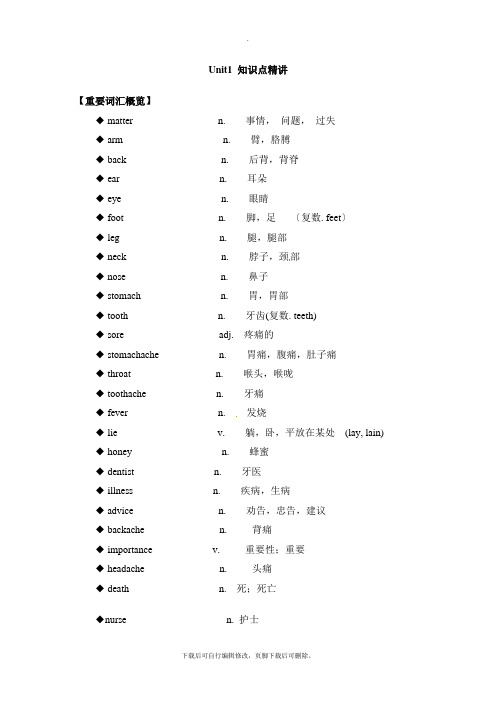
Unit1 知识点精讲【重要词汇概览】◆ matter n.事情,问题,过失◆ arm n.臂,胳膊◆ back n.后背,背脊◆ ear n.耳朵◆ eye n.眼睛◆ foot n.脚,足〔复数. feet〕◆ leg n.腿,腿部◆ neck n.脖子,颈部◆ nose n.鼻子◆ stomach n.胃,胃部◆ tooth n.牙齿(复数. teeth)◆ sore adj.疼痛的◆ stomachache n.胃痛,腹痛,肚子痛◆ throat n.喉头,喉咙◆ toothache n.牙痛◆ fever n.发烧◆ lie v.躺,卧,平放在某处(lay, lain)◆ honey n.蜂蜜◆ dentist n.牙医◆ illness n.疾病,生病◆ advice n.劝告,忠告,建议◆ backache n.背痛◆ importance v. 重要性;重要◆ headache n. 头痛◆ death n. 死;死亡◆nurse n. 护士◆ knife n. (复数.knives)刀【重要词组概览】◆ have a cold患感冒◆ take breaks(take a break) 休息◆ lie down 躺下◆ get off 下车◆ be used to 习惯于...;适应于...◆ on the other hand另一方面◆ get a cold患感冒◆ see a dentist看牙医◆take one’s temperature 量体温◆ make sb sick使某人不舒服(患锁病)◆ have a sore throat嗓子痛◆ have a fever发烧,发热◆ have a toothache牙痛◆ have a backache背痛◆ have a headache头痛◆give up 放弃◆cut off 切除◆get out 〔of〕用尽;耗尽◆take risks〔take a risk〕冒险◆get into 陷入;参与◆right away 立即;马上◆to one’s s urprise 使...惊讶的;出乎...意料【语法知识聚焦】看病需要和医生交流,这是英语口语中必不可少的内容。
人教版八年级英语下册 Unit1 知识点讲解
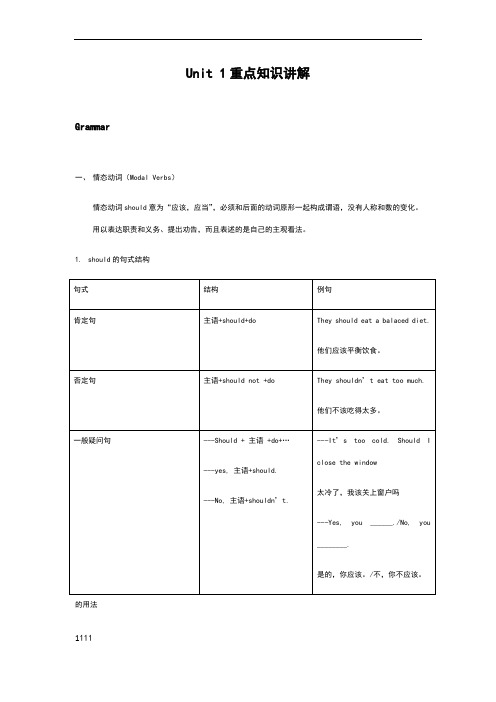
Unit 1重点知识讲解Grammar一、情态动词(Modal Verbs)情态动词should意为“应该,应当”,必须和后面的动词原形一起构成谓语,没有人称和数的变化。
用以表达职责和义务、提出劝告,而且表述的是自己的主观看法。
1.should的句式结构的用法注意:should在以why,who,how等疑问词开头的问句中,意为“竟然,居然,怎么会”,表示意外、惊喜或在说话人看来是不可思议的。
二、其他表示建议的句型三、反身代词表示反射或强调的代词叫做反身代词。
反身代词是由第一人称、第二人称形容词性物主代词或第三人称代词的宾格形式,词尾加self或selves组成。
反身代词可译“本人”、“本身”,为加强语气,也常翻译为“亲自”、“自己”。
不定人称代词one-----oneself.1、反身代词的分类2、反身代词的用法单词的用法Section A1.What’s the matter怎么了该句常用询问某人患了何种疾病或遇到了什么麻烦,其后用with引出对象。
1). What’s the matter with sb.=what’s wrong with sb.=what’s the trouble/problem with sb.=what’s one’s trouble/problem. What’s the matter with Tom=what’s _________ with Tom=What’s the _________ with Tom=What’s Tom’s _________2). matter, 名词,“问题,事情”. We have important _________(matter) to discuss.我们有些重要的问题要讨论。
3). 动词,“要紧,关系重大”. It dosen’t _________ that you came late.2.I have a cold.我感冒了。
(完整版)人教版八年级英语下册Unit1知识点讲解(可编辑修改word版)

Unit 1 重点知识讲解Grammar一、情态动词(Modal Verbs)情态动词should 意为“应该,应当”,必须和后面的动词原形一起构成谓语,没有人称和数的变化。
用以表达职责和义务、提出劝告,而且表述的是自己的主观看法。
1.should 的句式结构2.s hould 的用法喜或在说话人看来是不可思议的。
二、其他表示建议的句型表示反射或强调的代词叫做反身代词。
反身代词是由第一人称、第二人称形容词性物主代词或第三人称代词的宾格形式,词尾加self 或selves 组成。
反身代词可译“本人”、“本身”,为加强语气,也常翻译为“亲自”、“自己”。
不定人称代词one ---- oneself.1、反身代词的分类2、反身代词的用法单词的用法Section A1.What’s the matter?怎么了?该句常用询问某人患了何种疾病或遇到了什么麻烦,其后用with 引出对象。
1). What’s the matter with sb.?=what’s wrong with sb.?=what’s the trouble/problem with sb.?=what’s one’s trouble/problem?e.g. What’s the matter with Tom?=what’s with Tom?=What’s the with Tom?=What’s Tom’s?2). matter, 名词,“问题,事情”e.g. We have important (matter) to discuss.我们有些重要的问题要讨论。
3). 动词,“要紧,关系重大”e.g. It dosen’t that you came late.2.I have a cold.我感冒了。
1).have/get/catch a cold “感冒,着凉”The old man a cold yesterday.那位老人昨天感冒了。
人教版英语八年级下册第一单元Unit 1知识点
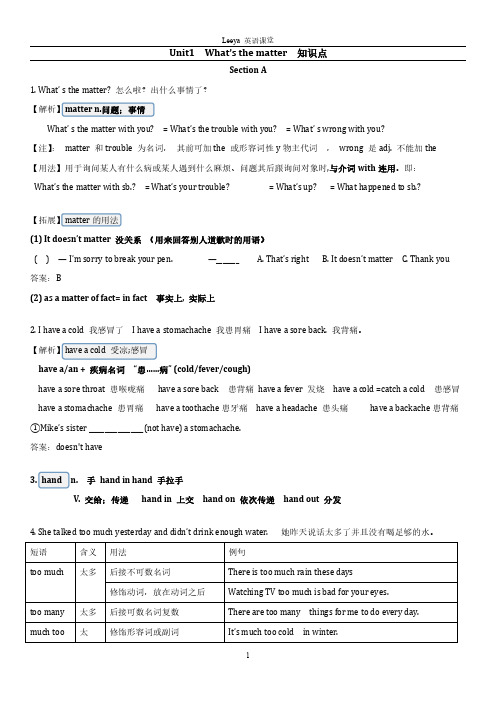
Unit1What’s the matter知识点Section A1.What’s the matter?怎么啦?出什么事情了?【解析】matter n.问题;事情What’s the matter with you?=What’s the trouble with you?=What’s wrong with you?【注】:matter和trouble为名词,其前可加the或形容词性y物主代词,wrong是adj.不能加the【用法】用于询问某人有什么病或某人遇到什么麻烦、问题其后跟询问对象时,与介词with连用。
即:What’s the matter with sb.?=What’s your trouble?=What’s up?=What happened to sb.?【拓展】matter的用法(1)It doesn’t matter没关系(用来回答别人道歉时的用语)()—I’m sorry to break your pen.—_______ A.That’s right B.It doesn’t matter C.Thank you 答案:B(2)as a matter of fact=in fact事实上,实际上2.I have a cold我感冒了I have a stomachache我患胃痛I have a sore back.我背痛。
【解析】have a cold受凉;感冒have a/an+疾病名词“患……病”(cold/fever/cough)have a sore throat患喉咙痛have a sore back患背痛have a fever发烧have a cold=catch a cold患感冒have a stomachache患胃痛have a toothache患牙痛have a headache患头痛have a backache患背痛①Mike’s sister_________________(not have)a stomachache.答案:doesn't have3.hand n.手hand in hand手拉手V.交给;传递hand in上交hand on依次传递hand out分发4.She talked too much yesterday and didn’t drink enough water.她昨天说话太多了并且没有喝足够的水。
人教版英语八年级下册第一单元知识点
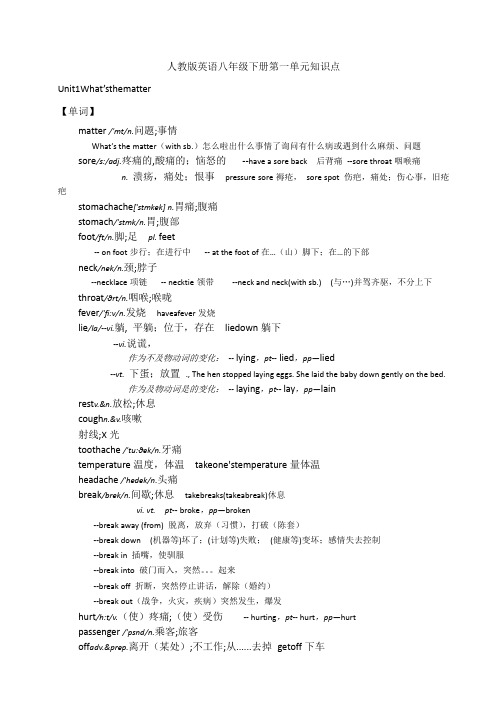
人教版英语八年级下册第一单元知识点Unit1What’sthematter【单词】matter /'mt/n.问题;事情What’s the matter(with sb.)怎么啦出什么事情了询问有什么病或遇到什么麻烦、问题sore/s:/adj.疼痛的,酸痛的;恼怒的--have a sore back 后背痛--sore throat咽喉痛n. 溃疡,痛处;恨事pressure sore褥疮,sore spot 伤疤,痛处;伤心事,旧疮疤stomachache['stmkek] n.胃痛;腹痛stomach/'stmk/n.胃;腹部foot/ft/n.脚;足pl. feet-- on foot步行;在进行中-- at the foot of在…(山)脚下;在…的下部neck/nek/n.颈;脖子--necklace项链-- necktie领带--neck and neck(with sb.) (与…)并驾齐驱,不分上下throat/θrt/n.咽喉;喉咙fever/'fi:v/n.发烧haveafever发烧lie/la/--vi.躺, 平躺;位于,存在liedown躺下--vi.说谎,作为不及物动词的变化:-- lying,pt-- lied,pp—lied--vt. 下蛋;放置., The hen stopped laying eggs. She laid the baby down gently on the bed.作为及物动词是的变化:-- laying,pt-- lay,pp—lainrest v.&n.放松;休息cough n.&v.咳嗽射线;X光toothache /'tu:θek/n.牙痛temperature温度,体温takeone'stemperature量体温headache /'hedek/n.头痛break/brek/n.间歇;休息takebreaks(takeabreak)休息vi. vt.pt--broke,pp—broken--break away (from) 脱离,放弃(习惯),打破(陈套)--break down (机器等)坏了;(计划等)失败;(健康等)变坏;感情失去控制--break in 插嘴,使驯服--break into 破门而入,突然。
人教八年级下册英语单词表unit1-10用法讲解(共28张PPT)
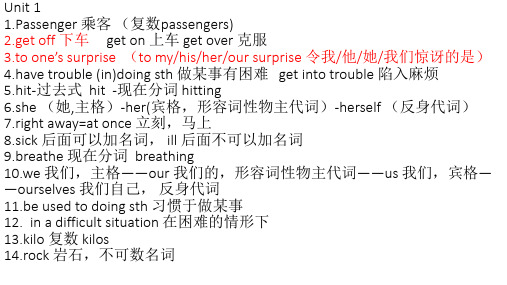
15.人+run out of 物+run out 16.cut it/them off 切除它/它们 17.blood 血,不可数 18.mean 意思是, ——meaning (n. 意思) 19.importance 重要性 —— important (adj. 重要的) 20.decision 决定 —— decide (v. 决定) make a decision to do sth =decide to do sth 决定去做某事 21.death 死亡——die(v. 死) ——dead(adj. 死的)——dying (adj. 奄奄一息的) 22.give up doing sth 放弃做某事 23.nurse 护士 (可数名词)
I stay at home instead of going out
=I don’t go out, instead, I stay at home. 7.turn A into B 把A变成B
8.hide sth from sth 隐藏某物避免某物 9.magic adj. 有魔力的 magician n. 魔术师 10.excite 使激动 excited 修饰人 exciting 修饰物 11.Western adj. 西方的 west n. 西方 12.once upon a time 从前 =long long ago 13.fall in love with sb. 爱 上某人 14.fit sb /sth 适合某人或某物 15.a couple of 一对几个 16.smile at sb 对某人微笑
19.icy adj. 覆盖着冰的
ice n. 冰
20.make one’s way to +地点(home ,here, there 不加to)
人教版英语八年级下册第1单元重点知识汇总
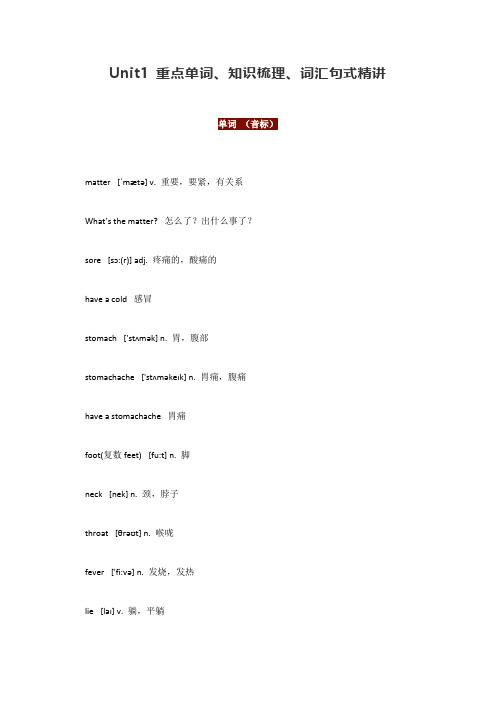
Unit1 重点单词、知识梳理、词汇句式精讲matter [ˈmætə] v. 重要,要紧,有关系What’s the matter? 怎么了?出什么事了?sore [sɔ:(r)] adj. 疼痛的,酸痛的have a cold 感冒stomach ['stʌmək] n. 胃,腹部stomachache ['stʌməkeɪk] n. 胃痛,腹痛have a stomachache 胃痛foot(复数feet) [fu:t] n. 脚neck [nek] n. 颈,脖子throat [θrəʊt] n. 喉咙fever ['fi:və] n. 发烧,发热lie [laɪ] v. 躺,平躺lie down 躺下rest [rest] n. 剩余部分,其余;放松,休息cough [kɒf] n. & v. 咳嗽X-ray ['eksreɪ] n. X光,X射线toothache [ˈtu:θeɪk] n. 牙痛take one's temperature 量体温headache [ˈhedeɪk] n. 头痛have a fever 发烧break [breɪk] n. & v. 休息,暂停;打破take breaks (take a break)休息hurt [hə:t] v. 伤害,损害,使受伤,疼passenger ['pæsɪndʒə] n. 乘客,旅客off [ɒf] adv. prep. 离开(某处);从…去掉get off 下车to one's surprise 使…惊讶,出乎…意料onto [ˈɒntə] prep. 向,朝trouble [ˈtrʌbl] n. 麻烦,烦扰,问题hit [hit] n. & v. 碰撞,打,打击right away 立即,马上get into 陷入,参与herself [hə:ˈself]她自己,她本身(she的反身代词)bandage ['bændɪdʒ] n. & v. 绷带;用绷带包扎sick [sɪk] adj. 患病的,不适的knee [ni:] n. 膝盖nosebleed [ˈnəʊzbli:d] n. 鼻出血breathe [bri:ð] v. 呼吸sunburned [ˈsʌnbɜ:nd] adj. 晒伤的ourselves [ɑ:ˈselvz]我们自己(we的反身代词)climber [ˈklaɪmə(r)] n. 登山者be used to 习惯于… 适应于…risk [rɪsk] n. & v. 风险,危险;冒险take risks (take a risk) 冒险accident [ˈæksidənt] n. 意外事件;事故situation [ˌsitjuˈeiʃən] n. 状况,形式,情况kg=kilogram [ˈkɪləgræm] n. 公斤,千克rock [rɔk] n. 岩石run out (of) 用尽,耗尽knife [naif] n. 刀,餐刀cut off 切除blood [blʌd] n. 血mean [mi:n] v. 意味着,意思是,意欲get out of 离开,从… 出来importance [ɪmˈpɔ:tns] n. 重要性decision [dɪ'sɪʒn] n. 决心,决定,抉择control [kən'trəʊl] v. 控制,支配,操纵be in control of 掌管,管理spirit ['spɪrɪt] n. 勇气,意志death [deθ] n. 死亡give up 放弃nurse [nə:s] n. 护士Judy 朱迪(女名)Nancy 南希(女名)Mandy 曼迪(女名)Aron Ralston 阿伦·罗尔斯顿Utah 尤他州(美国)Unit1 知识梳理【重点单词】matter [ˈmætə] v. 重要,要紧,有关系What’s the matter? 怎么了?出什么事了?sore [sɔ:(r)] adj. 疼痛的,酸痛的have a cold 感冒stomach ['stʌmək] n. 胃,腹部stomachache ['stʌməkeɪk] n. 胃痛,腹痛have a stomachache 胃痛foot(复数feet) [fu:t] n. 脚neck [nek] n. 颈,脖子throat [θrəʊt] n. 喉咙fever ['fi:və] n. 发烧,发热lie [laɪ] v. 躺,平躺lie down 躺下rest [rest] n. 剩余部分,其余;放松,休息cough [kɒf] n. & v. 咳嗽X-ray ['eksreɪ] n. X光,X射线toothache [ˈtu:θeɪk] n. 牙痛take one's temperature 量体温headache [ˈhedeɪk] n. 头痛have a fever 发烧break [breɪk] n. & v. 休息,暂停;打破take breaks (take a break)休息hurt [hə:t] v. 伤害,损害,使受伤passenger ['pæsɪndʒə] n. 乘客,旅客off [ɒf] adv. prep. 离开(某处);从…去掉get off 下车to one's surprise 使…惊讶,出乎…意料onto [ˈɒntə] prep. 向,朝trouble [ˈtrʌbl] n. 麻烦,烦扰,问题hit [hit] n. & v. 碰撞,打,打击right away 立即,马上get into 陷入,参与herself [hə:ˈself] pron. 她自己,她本身(she的反身代词)bandage ['bændɪdʒ] n. & v. 绷带;用绷带包扎sick [sɪk] adj. 患病的,不适的knee [ni:] n. 膝盖nosebleed [ˈnəʊzbli:d] n. 鼻出血breathe [bri:ð] v. 呼吸sunburned [ˈsʌnbɜ:nd] adj. 晒伤的ourselves [ɑ:ˈselvz] pron. 我们自己(we的反身代词)climber [ˈklaɪmə(r)] n. 登山者be used to 习惯于… 适应于…risk [rɪsk] n. & v. 风险,危险;冒险take risks (take a risk) 冒险accident [ˈæksidənt] n. 意外事件;事故situation [ˌsitjuˈeiʃən] n. 状况,形式,情况kg=kilogram [ˈkɪləgræm] n. 公斤,千克rock [rɔk] n. 岩石run out (of) 用尽,耗尽knife [naif] n. 刀,餐刀cut off 切除blood [blʌd] n. 血mean [mi:n] v. 意味着,意思是,意欲get out of 离开,从… 出来importance [ɪmˈpɔ:tns] n. 重要性decision [dɪ'sɪʒn] n. 决心,决定,抉择control [kən'trəʊl] v. 控制,支配,操纵be in control of 掌管,管理spirit ['spɪrɪt] n. 勇气,意志death [deθ] n. 死亡give up 放弃nurse [nə:s] n. 护士【重点短语】1.have a fever 发烧2.have a cough 咳嗽3.have a toothache 牙疼4.talk too much 说得太多5.drink enough water 喝足够的水6.have a cold 受凉;感冒7.have a stomachache 胃疼8.have a sore back 背疼9.have a sore throat 喉咙痛10. take risks 冒险11.hot tea with honey 加蜂蜜的热茶12.see a dentist 看牙医13.get an X-ray 拍X 光片14.take one’ s temperature 量体温15.put some medicine on sth. 在……上面敷药16. give up 放弃17. sound like 听起来像18. all weekend 整个周末19. in the same way 以同样的方式20. go to a doctor 看医生21. go along 沿着……走22. on the side of the road 在马路边23. shout for help 大声呼救24. without thinking twice 没有多想25. get off 下车26. have a heart problem 有心脏病27. to one’ s surprise 另某人惊讶的是28. thanks to 多亏了;由于29. in time 及时30. make a decision 做出决定31. get into trouble 造成麻烦32. right away 立刻;马上33. because of 由于34. get out of 离开;从……出来35. keep on doing sth. 继续或坚持做某事36. put a bandage on sth. 用绷带包扎37. fall down 摔倒38. feel sick 感到恶心39. have a nosebleed 流鼻血40. cut his knee 割伤他的膝盖41. put her head back 把她的头向后仰42. have problems breathing 呼吸困难43. mountain climbing 登山运动44. be used to doing sth. 习惯做某事45. run out (of) 用完;用尽46. so that 以便47. so...that... 如此……以至于...…48. be in control of 掌管;管理49. in a difficult situation 在闲境中【重点句型】1. What's the matter with you?= What'the trouble with you?= What's wrong with you? 你怎么了?2. What should she do? 她该怎么办呢?3.Should I take my temperature? 我应该量一下体温吗?4.You should lie down and rest. 你应该躺下休息一会儿。
人教版丨八年级下册Unit1单词,知识梳理,词汇句式精讲
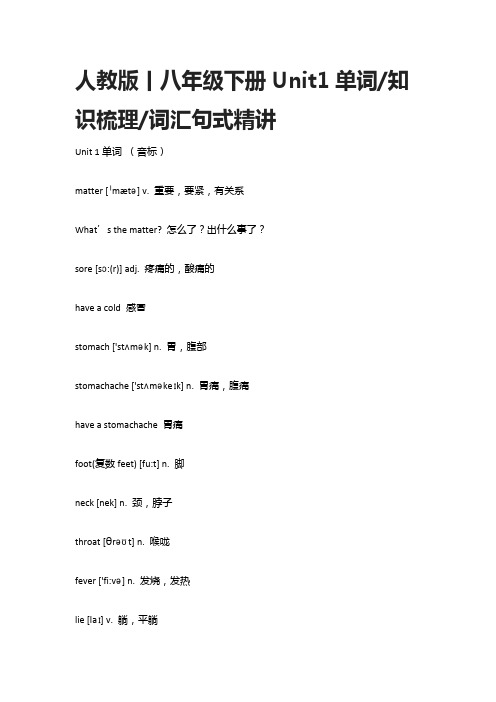
人教版丨八年级下册Unit1单词/知识梳理/词汇句式精讲Unit 1单词(音标)matter [ˈmætə] v. 重要,要紧,有关系What’s the matter? 怎么了?出什么事了?sore [sɔ:(r)] adj. 疼痛的,酸痛的have a cold 感冒stomach ['stʌmək] n. 胃,腹部stomachache ['stʌməkeɪk] n. 胃痛,腹痛have a stomachache 胃痛foot(复数feet) [fu:t] n. 脚neck [nek] n. 颈,脖子throat [θrəʊt] n. 喉咙fever ['fi:və] n. 发烧,发热lie [laɪ] v. 躺,平躺lie down 躺下rest [rest] n. 剩余部分,其余;放松,休息cough [kɒf] n. & v. 咳嗽X-ray ['eksreɪ] n. X光,X射线toothache [ˈtu:θeɪk] n. 牙痛take one's temperature 量体温headache [ˈhedeɪk] n. 头痛have a fever 发烧break [breɪk] n. & v. 休息,暂停;打破take breaks (take a break)休息hurt [hə:t] v. 伤害,损害,使受伤,疼passenger ['pæsɪndʒə] n. 乘客,旅客off [ɒf] adv. prep. 离开(某处);从…去掉get off 下车to one's surprise 使…惊讶,出乎…意料onto [ˈɒntə] prep. 向,朝trouble [ˈtrʌbl] n. 麻烦,烦扰,问题hit [hit] n. & v. 碰撞,打,打击right away 立即,马上get into 陷入,参与herself [hə:ˈself]她自己,她本身(she的反身代词)bandage ['bændɪdʒ] n. & v. 绷带;用绷带包扎sick [sɪk] adj. 患病的,不适的knee [ni:] n. 膝盖nosebleed [ˈnəʊzbli:d] n. 鼻出血breathe [bri:ð] v. 呼吸sunburned [ˈsʌnbɜ:nd] adj. 晒伤的ourselves [ɑ:ˈselvz]我们自己(we的反身代词)climber [ˈklaɪmə(r)] n. 登山者be used to 习惯于…适应于…risk [rɪsk] n. & v. 风险,危险;冒险take risks (take a risk) 冒险accident [ˈæksidənt] n. 意外事件;事故situation [ˌsitjuˈeiʃən] n. 状况,形式,情况kg=kilogram [ˈkɪləgræm] n. 公斤,千克rock [rɔk] n. 岩石run out (of) 用尽,耗尽knife [naif] n. 刀,餐刀cut off 切除blood [blʌd] n. 血mean [mi:n] v. 意味着,意思是,意欲get out of 离开,从…出来importance [ɪmˈpɔ:tns] n. 重要性decision [dɪ'sɪʒn] n. 决心,决定,抉择control [kən'trəʊl] v. 控制,支配,操纵be in control of 掌管,管理spirit ['spɪrɪt] n. 勇气,意志death [deθ] n. 死亡give up 放弃nurse [nə:s] n. 护士Judy 朱迪(女名)Nancy 南希(女名)Mandy 曼迪(女名)Aron Ralston 阿伦·罗尔斯顿Utah 尤他州(美国)知识梳理【重点单词】matter [ˈmætə] v. 重要,要紧,有关系What’s the matter? 怎么了?出什么事了?sore [sɔ:(r)] adj. 疼痛的,酸痛的have a cold 感冒stomach ['stʌmək] n. 胃,腹部stomachache ['stʌməkeɪk] n. 胃痛,腹痛have a stomachache 胃痛foot(复数feet) [fu:t] n. 脚neck [nek] n. 颈,脖子throat [θrəʊt] n. 喉咙fever ['fi:və] n. 发烧,发热lie [laɪ] v. 躺,平躺lie down 躺下rest [rest] n. 剩余部分,其余;放松,休息cough [kɒf] n. & v. 咳嗽X-ray ['eksreɪ] n. X光,X射线toothache [ˈtu:θeɪk] n. 牙痛take one's temperature 量体温headache [ˈhedeɪk] n. 头痛have a fever 发烧break [breɪk] n. & v. 休息,暂停;打破take breaks (take a break)休息hurt [hə:t] v. 伤害,损害,使受伤passenger ['pæsɪndʒə] n. 乘客,旅客off [ɒf] adv. prep. 离开(某处);从…去掉get off 下车to one's surprise 使…惊讶,出乎…意料onto [ˈɒntə] prep. 向,朝trouble [ˈtrʌbl] n. 麻烦,烦扰,问题hit [hit] n. & v. 碰撞,打,打击right away 立即,马上get into 陷入,参与herself [hə:ˈself] pron. 她自己,她本身(she的反身代词)bandage ['bændɪdʒ] n. & v. 绷带;用绷带包扎sick [sɪk] adj. 患病的,不适的knee [ni:] n. 膝盖nosebleed [ˈnəʊzbli:d] n. 鼻出血breathe [bri:ð] v. 呼吸sunburned [ˈsʌnbɜ:nd] adj. 晒伤的ourselves [ɑ:ˈselvz] pron. 我们自己(we的反身代词)climber [ˈklaɪmə(r)] n. 登山者be used to 习惯于…适应于…risk [rɪsk] n. & v. 风险,危险;冒险take risks (take a risk) 冒险accident [ˈæksidənt] n. 意外事件;事故situation [ˌsitjuˈeiʃən] n. 状况,形式,情况kg=kilogram [ˈkɪləgræm] n. 公斤,千克rock [rɔk] n. 岩石run out (of) 用尽,耗尽knife [naif] n. 刀,餐刀cut off 切除blood [blʌd] n. 血mean [mi:n] v. 意味着,意思是,意欲get out of 离开,从…出来importance [ɪmˈpɔ:tns] n. 重要性decision [dɪ'sɪʒn] n. 决心,决定,抉择control [kən'trəʊl] v. 控制,支配,操纵be in control of 掌管,管理spirit ['spɪrɪt] n. 勇气,意志death [deθ] n. 死亡give up 放弃nurse [nə:s] n. 护士【重点短语】1.have a fever 发烧2.have a cough 咳嗽3.have a toothache 牙疼4.talk too much 说得太多5.drink enough water 喝足够的水6.have a cold 受凉;感冒7.have a stomachache 胃疼8.have a sore back 背疼9.have a sore throat 喉咙痛10. take risks 冒险11.hot tea with honey 加蜂蜜的热茶12.see a dentist 看牙医13.get an X-ray 拍X 光片14.take one’s temperature 量体温15.put some medicine on sth. 在……上面敷药16. give up 放弃17. sound like 听起来像18. all weekend 整个周末19. in the same way 以同样的方式20. go to a doctor 看医生21. go along 沿着……走22. on the side of the road 在马路边23. shout for help 大声呼救24. without thinking twice 没有多想25. get off 下车26. have a heart problem 有心脏病27. to one’s surprise 另某人惊讶的是28. thanks to 多亏了;由于29. in time 及时30. make a decision 做出决定31. get into trouble 造成麻烦32. right away 立刻;马上33. because of 由于34. get out of 离开;从……出来35. keep on doing sth. 继续或坚持做某事36. put a bandage on sth. 用绷带包扎37. fall down 摔倒38. feel sick 感到恶心39. have a nosebleed 流鼻血40. cut his knee 割伤他的膝盖41. put her head back 把她的头向后仰42. have problems breathing 呼吸困难43. mountain climbing 登山运动44. be used to doing sth. 习惯做某事45. run out (of) 用完;用尽46. so that 以便47. so...that... 如此……以至于...…48. be in control of 掌管;管理49. in a difficult situation 在闲境中【重点句型】1. What's the matter with you?= What'the trouble with you?= What's wrong with you? 你怎么了?2. What should she do? 她该怎么办呢?3.Should I take my temperature? 我应该量一下体温吗?4.You should lie down and rest. 你应该躺下休息一会儿。
英语单词拆分趣味快速记忆人教版八年级下册 Unit 1
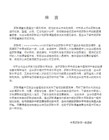
sick [sɪk] adj. 生病的;有病的 分析:si-司、ck-仓库 记忆方法:生病的司机在仓库休息。
knee [niː] n.膝;膝盖 分析:kn-柯南、ee-双眼 记忆方法:柯南的双眼被膝盖顶了一下。
nosebleed ['nəʊzbliːd] n.鼻出血 分析:nose-鼻子、bleed-流血 记忆方法:鼻子流血就是鼻出血。
take breaks (take a break) 休息
hurt [hɜːt] v. (hurt/hɜː(r)t)(使)疼痛;受伤 分析:hu-虎、rt-肉体 记忆方法:老虎的肉体受伤了。
passenger ['pæsɪndʒə(r)] n. 乘客;旅客 分析:pass-通过、en-恩、ge-鸽、r-小草 记忆方法:乘客通过恩人的一对鸽子找到了小草。
trouble [ˈtrʌbl] n.问题;苦恼 分析:t-兔、rou-肉、ble-饱了 记忆方法:兔子很苦恼,因为看到肉就饱了。
hit [hɪt] v.(hit/hɪt) (用手或器具)击;打 分析:h-椅子、it-它 记忆方法:用椅子击中了它。
right away 立即;马上
get into 陷入;参与
have a cold 感冒
stomachache ['stʌməkeɪk] n. 胃痛;腹痛 分析:st-石头、ma-妈、chache-叉车 记忆方法:石头掉在妈妈的叉车上,妈妈气得腹痛。
have a stomachache 胃痛
foot [fʊt] n. 脚;足 分析:fo-佛、ot-呕吐 记忆方法:佛闻到臭脚的味道也呕吐了。
fever [ˈfi:və(r)] n. 发烧 分析:fe-飞蛾、v-数字“五”、er-儿 记忆方法:飞蛾发烧后生出五个儿子。
人教版八年级英语下册 Unit1 What's the matter单词讲解
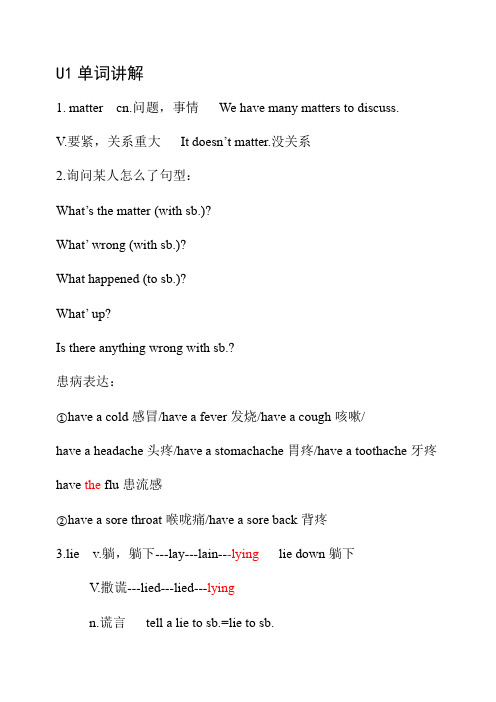
U1单词讲解1.matter cn.问题,事情We have many matters to discuss.V.要紧,关系重大It doesn’t matter.没关系2.询问某人怎么了句型:What’s the matter (with sb.)?What’ wrong (with sb.)?What happened (to sb.)?What’ up?Is there anything wrong with sb.?患病表达:①have a cold感冒/have a fever发烧/have a cough咳嗽/have a headache头疼/have a stomachache胃疼/have a toothache牙疼have the flu患流感②have a sore throat喉咙痛/have a sore back背疼3.lie v.躺,躺下---lay---lain---lying lie down躺下V.撒谎---lied---lied---lyingn.谎言tell a lie to sb.=lie to sb.4.rest n.休息&v.休息rest=have a restadj.剩余的the rest of...5.break n.休息take a break=take breaksv.①打破break the window ②违背break the law/rulebreak up打碎break down出故障break out爆发break into闯入6.get off下车---get on上车(空间大:bus)get in上车----get out of下车(空间小:car)7.trouble n.问题,苦恼have trouble/difficulty/problems(in) doing sth.eg:I have trouble in learning English.get into trouble陷入麻烦get out of trouble摆脱麻烦V.麻烦trouble sb. to do sth.麻烦某人做某事8.right away立即,马上=at once=right now=immediately9.sick adj.生病的,有病的be sick=be ill 但是ill只能做表语adj.恶心的,厌倦的feel sick感到恶心10.b reathe v.呼吸---breath n.呼吸take a deep breath深呼吸11.b e used to doing习惯于做某事used to do过去常常做某事be used to do被用来做某事eg:I used to drive to work,but now I am used to taking a bus.12.r isk v.冒险risk doing冒险做某事n.风险,危险take a risk=take risks13.accident n.事故----accidental adj.意外的---accidently adv.意外地14.sb. run out of sth.用完,用尽sth. run out15.cut---cut---cut---cuttingcut off切除cut up切碎cut down砍倒,减少cut out删除,剪下cut in插嘴16.m ean---meant---meantmean to do打算做某事mean doing意味着做某事meaning n.意思What’s the meaning of...?=What does ... mean?=What do you mean by...?meaningful adj.有意义的---meaningfully adv.meaningless adj.无意义的---meaninglessly adv.17.i mportant n.重要性---important adj.重要的the importance of... ...的重要性18.d ecision n.决定---decide v.决定decide to do=make a decision to do19.c ontrol控制,管理---controlled---controlledbe in control在控制下be out of control失去控制20.d eath n.死,死亡---die v.死---dead adj.死了的---dying adj.垂死的eg:The dog’s death makes me sad.The dog died 3 days ago.The dog was dead when I found it.21.g ive up放弃give up doing give it/them upgive away捐赠give out分发give off发出(光、热等)give in屈服。
人教版英语八年级下册Unit1知识点知识讲解
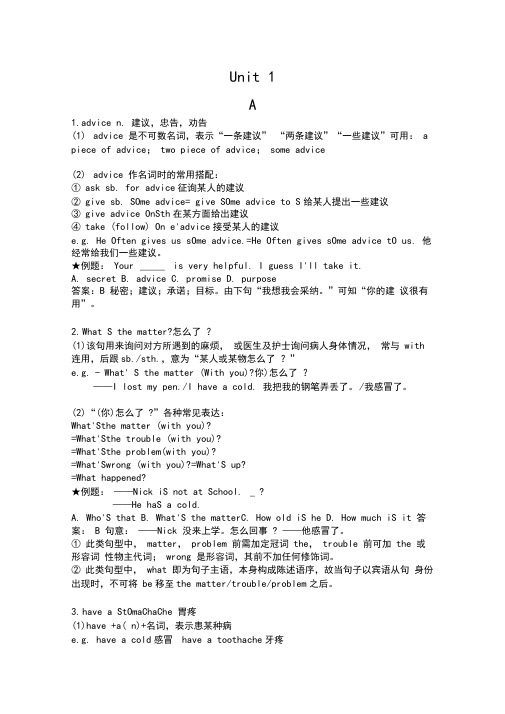
Unit 1A1.advice n. 建议,忠告,劝告(1)advice 是不可数名词,表示“一条建议” “两条建议”“一些建议”可用:a piece of advice;two piece of advice;some advice(2)advice 作名词时的常用搭配:①ask sb. for advice征询某人的建议②give sb. SOme advice= give SOme advice to S给某人提出一些建议③give advice OnSth在某方面给出建议④take (follow) On e'advice接受某人的建议e.g. He Often gives us sOme advice.=He Often gives sOme advice tO us. 他经常给我们一些建议。
★例题:Your _____ is very helpful. I guess I'll take it.A. secretB. adviceC. promiseD. purpose答案:B 秘密;建议;承诺;目标。
由下句“我想我会采纳。
”可知“你的建议很有用”。
2.What S the matter?怎么了?(1)该句用来询问对方所遇到的麻烦,或医生及护士询问病人身体情况,常与with 连用,后跟sb./sth.,意为“某人或某物怎么了?”e.g. - What' S the matter (With you)?你)怎么了?——I lost my pen./I have a cold. 我把我的钢笔弄丢了。
/我感冒了。
(2)“(你)怎么了?”各种常见表达:What'Sthe matter (with you)?=What'Sthe trouble (with you)?=What'Sthe problem(with you)?=What'Swrong (with you)?=What'S up?=What happened?★例题:——Nick iS not at School. _ ?——He haS a cold.A. Who'S thatB. What'S the matterC. How old iS heD. How much iS it 答案:B 句意:——Nick 没来上学。
Unit1 单词详解 人教版八年级英语下册
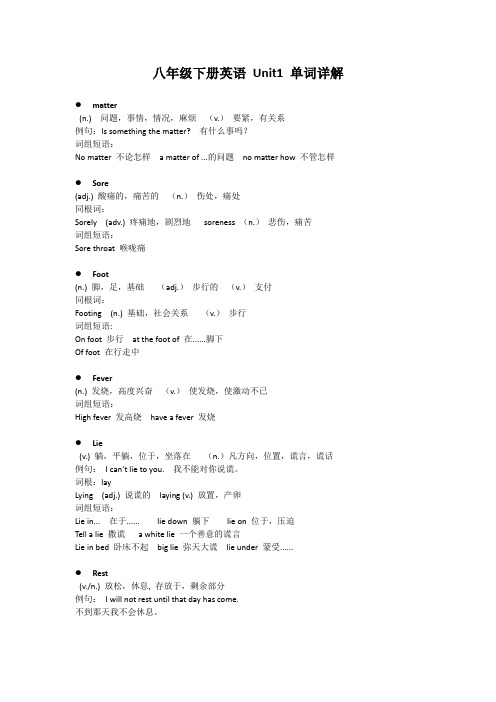
八年级下册英语Unit1 单词详解●matter(n.) 问题,事情,情况,麻烦(v.)要紧,有关系例句:Is something the matter? 有什么事吗?词组短语:No matter 不论怎样 a matter of ...的问题no matter how 不管怎样●Sore(adj.) 酸痛的,痛苦的(n.)伤处,痛处同根词:Sorely (adv.) 疼痛地,剧烈地soreness (n.)悲伤,痛苦词组短语:Sore throat 喉咙痛●Foot(n.) 脚,足,基础(adj.)步行的(v.)支付同根词:Footing (n.) 基础,社会关系(v.)步行词组短语:On foot 步行at the foot of 在......脚下Of foot 在行走中●Fever(n.) 发烧,高度兴奋(v.)使发烧,使激动不已词组短语:High fever 发高烧have a fever 发烧●Lie(v.) 躺,平躺,位于,坐落在(n.)凡方向,位置,谎言,谎话例句:I can’t lie to you. 我不能对你说谎。
词根:layLying (adj.) 说谎的laying (v.) 放置,产卵词组短语:Lie in... 在于...... lie down 躺下lie on 位于,压迫Tell a lie 撒谎 a white lie 一个善意的谎言Lie in bed 卧床不起big lie 弥天大谎lie under 蒙受......●Rest(v./n.) 放松,休息, 存放于,剩余部分例句:I will not rest until that day has come.不到那天我不会休息。
[补充]Not...until... 直到......才......同根词:Restless (adj.) 不安宁的,得不到满足的Resrlessly (adv.)不安地,慌张地rester(n.)休息的人词组短语:The rest of 其余的,剩下的at rest 静止,休息Have a rest 休息一会儿= take a restRest upon 依赖于,取决于= depend on = depend upon Rest room 休息室●Hurt(v.) 受伤,损害(adj. )受伤的,痛苦的(n.) 委屈,心灵创伤例句:She hurt herself. 她弄伤了自己。
- 1、下载文档前请自行甄别文档内容的完整性,平台不提供额外的编辑、内容补充、找答案等附加服务。
- 2、"仅部分预览"的文档,不可在线预览部分如存在完整性等问题,可反馈申请退款(可完整预览的文档不适用该条件!)。
- 3、如文档侵犯您的权益,请联系客服反馈,我们会尽快为您处理(人工客服工作时间:9:00-18:30)。
人教版八年级下册Unit 1单词讲解
matter
n.事件;(讨论、考虑等的)问题;vi.要紧,重要;有重大影响;有重要性
复数matters 过去式mattered 过去分词mattered 现在分词mattering 三单:matters
sore
adj.疼痛的;使人伤心的;发怒的;n.(肌肤的)痛处,伤处;
变形复数:sores adv. sorely 疼痛地;非常;剧烈地悲伤;痛苦;
sore throat 咽喉痛sore eyes 眼痛have a sore throat 嗓子疼
stomachache n.胃痛,腹痛;
变形复数:stomachaches
have a stomachache 胃痛;肚子疼
foot
n.脚;底部;脚步vt.走,踏;vt.& vi.结算,总计,共计;
变形复数feet 过去式footed 过去分词:footed 现在分词:footing 三单:foots on foot 步行;在进行中at the foot of 在…(山)脚下;在…的下部
under foot adv. 在地面;在脚底
neck
n.颈,脖子;衣领;海峡;vt.使变细;
变形复数:necks 过去式necked 过去分词necked 现在分词necking 三单:necks stomach['stmk]n.胃;腹部
throat[θrt]n.咽喉;喉咙
fever['fi:v]n.发烧
怎样表达某人生了什么病
(1)当主语为第三人称单数时,“have”要改为“has”。
(2)当表示疾病的名词以元音音素开头时,冠词“a”要变为“an”。
句型结构表达“某人生了什么病”的句型结构为:sb.+have/has+a/an+病痛名称.重点解析在此句型中,have表示“生病”,后常跟表示疾病的名词,是很常见的说法,常用于口语。
其他常见的表示“生了……病”的短语如下:
have a cold感冒,have a fever发烧,have a toothache牙疼,have an earache耳朵疼,have a flu得了流行性感冒,have a stomachache胃疼。
知识拓展除了have之外,还有一些词也可以表示“生了……病”。
(1)take,catch均可以表示“生病”且有“感染”之意。
美国人多用take,英国人用
catch。
例如:Tom takes cold easily.汤姆易患感冒。
His baby catches scarlet fever.他的孩子得了猩红热。
(2)get常作“生病”讲,后接表示疾病的名词。
例如:My uncle gets a flu.我叔叔得了
流行性感冒。
lie
vi. 躺;说谎;位于;展现vt. 谎骗n. 谎言;位置lie in 在于…;lie down 躺下lain,laid,lied,lay,lying的区别
lie 过去式过去分词现在分词1)躺lay lain lying 2)说谎lied lied lyinglay 1)下蛋laid laid laying2)放置laid laid laying
rest
n.休息;宁静,安宁vt.& vi.(使)休息;(使)倚靠[支撑];vi.休息;静止;停止;
变形复数:rests 过去式:rested 过去分词rested 现在分词resting 三单:rests the rest of 其余的;剩下的have a rest 休息一会儿a good rest 好好休息
rest time 休息时间;静止时间rest room 休息室;(公共建筑物内的)厕所cough
n. 咳嗽,咳嗽声;咳嗽病vt. 咳出vi. 咳嗽
cough up 咳出;勉强说出;have a cough (患)咳嗽
X-ray[eks re射线;X光
toothache['tu:θek]n.牙痛
take one's temperature 量体温
headache['hedek] n.头痛
have a fever发烧
break vt.(使)破;vi.(嗓音)突变;突破;n.破裂;中间休息;间断;变形过去式:broke 过去分词:broken 现在分词:breaking 第三人称单数:breaks
take breaks (take a break) 休息break out v. 爆发;突发break away 脱离;放弃;逃跑
break away from vt. 放弃;脱离……break up with与…断绝关系break the law 违法give me a break 让我休息一下break up 打碎,结束;解散;break down 分解;发生
hurt
vt.损害;使受伤;vi.疼痛;感到疼痛;n.伤害;痛苦;adj.受伤的;痛苦的;
变形复数:hurts 过去式:hurt 过去分词:hurt 现在分词:hurting 三单:hurts get hurt 受伤feel hurt 感到不快hurt badly严重受伤
passenger['psnd] n.乘客;旅客
off [f] adv.&prep.离开(某处);不工作;从……去掉
get off下车go off 离开;right off 立刻;马上from off 从…离开
to one' s surprise使……惊讶的;出乎……意料
onto['nt] prep.向;朝
trouble['trbl] n.问题;苦恼
in trouble 在监禁中;处于不幸中;处困难中have trouble v. 在...有困难
make trouble 捣乱;制造麻烦have trouble with v. 与...有纠纷;有...的病痛
out of trouble 摆脱麻烦;脱离了困境stomach trouble 胃病make trouble for 给……带来麻烦
知识讲解problem trouble matter disease
problem n.难题,问题;Do you know how to deal with this problem你知道怎样处理这个问题吗trouble 麻烦事;烦恼Tell me about your trouble.把你的烦恼讲给我听听。
matter 事情,问题We have more important matter to be considered.我们还有重要的事待考虑。
disease 疾病。
trouble不可数,matter ,problem 可数disease复数:diseases
hit
vt.& vi.打打击;碰撞;击(球);n.打,打击;碰撞;(演出等)成功;批评,
变形复数:hits 过去式:hit 过去分词:hit 现在分词:hitting 第三人称单数:hits
right away立即;马上get into陷入;参与。
